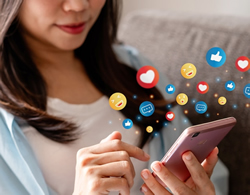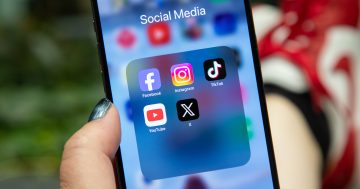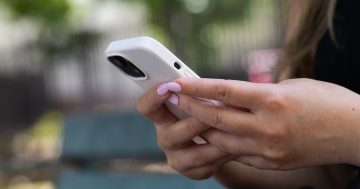Tahnee Jash* discusses the pros and cons of accepting friend requests from work mates or the boss on social media.
 How do you feel about following work colleagues — or your boss — on social media?
How do you feel about following work colleagues — or your boss — on social media?
Over brunch a couple of weekends ago, I was discussing this very topic with my friends.
Some were in favour while others had a clear line in the sand when it came to keeping work and their personal lives separate.
In a world where we share much of our life on social media, there’s no ‘right’ way to approach this — but hearing from someone who works in social media can be helpful.
Hannah Laxton-Koonce has been a social media producer at the ABC for almost four years.
She says, feeling comfortable with who follows you (and following people back) has a lot to do with your team and the culture of your workplace.
“I’m very privileged to be able to bring my ‘whole self’ to work,” she says.
“Whereas some people might not feel comfortable bringing their ‘whole selves’ to work so I can understand if they don’t want their manager or other staff to see [their posts].
“I think the question that you just have to keep in the back of your mind is, there are people who will see [your posts], and if someone was to bring it up in conversation, would you feel uncomfortable?”
We put a call out via the ABC Everyday Instagram for your thoughts and here’s what you shared.
Boundaries are pretty important
“My profile is public, but I’d prefer not to have colleagues as friends on there as I live a queer/poly life and my workplace is very straight.” — Jen
“Big ‘no’ unless they cross the ladder to real life besties (if you’d get silly drunk with them).” — Clauds
“Previously it didn’t worry me but now that I’ve moved into a management position, I avoid it.” — Miriam
“Depends on the colleague and my relationship with them.” —Ange
“Spend eight hours a day pretending to be ‘work appropriate’ then also have to censor yourself online. Lame!” — Abbie
Requests aren’t bad but limit what your teammates can see
“I hide my Instagram stories from them.” — Georgia
“I mostly use stories and hide them from colleagues.” — Phoebe
While this might feel like a good way to keep things separate, Hannah says it can be easy to slip up.
“One thing I would say about ‘close friends’ is just operating under the assumption that it’s going to be made public because that’s [what can] happen,” she says.
“The [‘close friends’] button is so close to [the public button] and it’s literally just the slip of a finger.”
Or use your accounts for different relationships
“If work people request my social media, I tell them to add me to LinkedIn instead.
Giving them access to see my cringey statuses or tagged pictures from 12 years ago? No thanks.” — Stace
“I have workmates on FB, which I post on rarely.
Instagram is for real/online friends only.” — Jessy
“I have lots of my colleagues on FB but none on IG. [It] allows me to keep stuff separate.” — Kaitlyn
Hannah is also mindful of the stuff she’s posting online and agrees with the idea of using different accounts for different purposes.
“I treat Facebook as if it was public,” she says.
“It’s a great way for me to keep all of my old photos in one place but other than that, I tend not to add my personal opinion [on there].
“Instagram is where I’m most vocal if I ever am writing stuff that’s more personal, but that’s knowing that my Instagram is on private.
“If I ever felt uncomfortable with [with a friend request] I would consider sending them to Facebook instead.”
Some people simply don’t mind
“It’s fine — I follow the rule of not sharing anything I wouldn’t want my grandma to see.” — Lou
“It’s a great way to break down barries at work but only for colleagues I like.” — Ala
“I’ve always had the opinion that ‘if my boss shouldn’t see it, it shouldn’t go online’.” — Emily
And other’s feel weird sending the request
“I don’t friend request them on purpose, but I feel obligated to accept if they friend request me.” — Rita
But Hannah says, you shouldn’t feel pressured to accept a request.
“I don’t think anyone should be offended or put off if you didn’t accept them.” She says.
“Social media is supposed to be a fun thing … people can understand if you don’t necessarily want [work and your personal] life to bleed into each other.
“People should feel emboldened and empowered to be honest and transparent and assert those boundaries where necessary,” she says.
*Tahnee Jash is a digital reporter for ABC Everyday.
This article first appeared at abc.net.au









